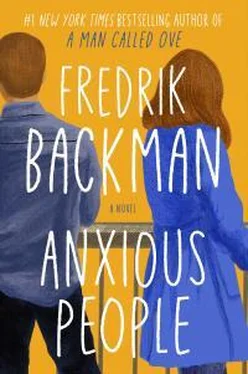JIM:I’m not sure if that’s more of an insult to me or the coffee.
ZARA:You said you wanted me to answer your questions honestly.
JIM:Yes, I suppose I did, didn’t I? Well, can I start by asking why you were in the apartment?
ZARA:What a stupid question. Were you the one standing in the stairwell when we were released?
JIM:Yes, that was me.
ZARA:So you were the first one into the apartment after we left? And you still managed to lose the bank robber?
JIM:I wasn’t actually first in. I waited for Jack, my colleague. You probably met him earlier. He was the first man into the apartment.
ZARA:You policemen all look alike, did you know that?
JIM:Jack’s my son. Maybe that’s why.
ZARA:Jim and Jack?
JIM:Yes. Like Jim Beam and Jack Daniel’s.
ZARA:Is that supposed to be funny?
JIM:No, no. My wife’s never found that funny, either.
ZARA:So you’re married, then? Well done you.
JIM:Yes, perhaps that isn’t entirely relevant right now. Can you give me a short explanation of why you were at the viewing of the apartment?
ZARA:It was an apartment viewing. Is that phrase too hard to understand?
JIM:So you were there to look at the apartment?
ZARA:You’re about as sharp as a wet box of cornflakes, aren’t you?
JIM:Does that mean yes?
ZARA:It means what it means.
JIM:What I mean is, were you planning to buy the apartment?
ZARA:Are you a real estate agent or a policeman?
JIM:I just mean that it would be easy to assume that you might be a little too well-off to be interested in that apartment.
ZARA:Oh, it would, would it?
JIM:Well, what I mean is that my colleagues and I might think that. One of them, anyway. My son, I mean. Based on some of the witness statements, I mean. You seem comfortably-off, that’s what I mean. And at first glance this apartment doesn’t look like the sort of thing that someone like you would want to buy.
ZARA:Listen, the problem with the middle class is that you think someone can be too rich to buy things. But that’s not true. You can only be too poor.
JIM:Well, perhaps we should move on. By the way, have I spelled your surname right here?
ZARA:No.
JIM:No?
ZARA:But there’s a perfectly logical reason why you think it’s spelled that way.
JIM:Oh?
ZARA:It’s because of the simple fact that you’re an idiot.
JIM:I’m sorry. Can you spell it out for me?
ZARA:I-d-i-o-t.
JIM:I meant your name?
ZARA:We’d be here all night, and some of us actually have important jobs to do, so why don’t I summarize things for you? A lunatic with a gun held me and a group of poor, less well-off people hostage for half a day, you and your colleagues surrounded the building, and the whole thing was on television, but you still managed to lose the bank robber. Right now you could have prioritized being out there trying to find the aforementioned bank robber, but instead you’re sitting here sweating because you’ve never seen a surname with more than three consonants in it before. Your bosses couldn’t make my taxes disappear faster if I’d given them matches.
JIM:I understand that you’re upset.
ZARA:That’s very clever of you.
JIM:I just meant that you’re in shock. I mean, no one expects to be threatened with a pistol when they go to view an apartment, do they? The papers may keep saying that the property market’s tough these days, but taking hostages is probably going a bit far. I mean, it says in the papers one day that it’s a “buyer’s market,” then the next that it’s a “seller’s market,” but in the end surely it’s always just the damn banks’ market? Don’t you think?
ZARA:Is that supposed to be a joke?
JIM:No, no, it’s supposed to be small talk. I just mean that the way society looks right now, the bank robber would have had considerably fewer police resources looking for him if he’d actually succeeded in robbing that bank than if he, as was actually the case, took all of you hostage. I mean, everyone hates banks. It’s like people say: “Sometimes it’s hard to know who the biggest crooks are, people who rob banks, or the people who run the banks.”
ZARA:Do people say that?
JIM:Yes. I think so. They do, don’t they? I just mean, I read in the paper yesterday about how much those bank bosses earn. They live in houses the size of palaces worth fifty million while ordinary people can barely manage to make their mortgage payments.
ZARA:Can I ask you a question?
JIM:Of course.
ZARA:Why is it that people like you always think successful people should be punished for their success?
JIM:What?
ZARA:Do you do some sort of advanced conspiracy role-play at Police College where you’re tricked into thinking that police officers get the same salary as bank bosses, or were you all just not capable of doing a bit of basic mathematics?
JIM:Yes, well. I mean, no.
ZARA:Or do you just think the world owes you something?
JIM:It’s just struck me, I never asked what you do for a living.
ZARA:I run a bank.
24
The truth is that Zara, who appears to be a little more than fifty years old, but exactly how much no one has ever dared ask, was never interested in buying the apartment. Not because she couldn’t afford it, of course, she could probably have bought it with the spare change she found between the cushions on the sofa in her own apartment. (Zara regarded coins as disgusting little havens of bacteria which have probably been touched by God knows how many middle-class fingers, and she’d rather have burned her sofa cushions than pick one up, so let’s put it like this: she could definitely have bought that apartment for the cost of her sofa.) So she went to the viewing with her nose already wrinkled, wearing diamond earrings large enough to knock out a medium-sized child, if that turned out to be necessary. But not even that, if you looked at her really closely, could hide the lurching grief inside her.
The first thing you have to understand is that Zara has recently been seeing a psychologist, because Zara has the sort of career which, if you do it for long enough, sometimes means you have to seek professional help to get instructions on what you can do with your life beyond having a career. Her first meeting with the psychologist didn’t go terribly well. Zara began by picking up a framed photograph from the desk and asking: “Who’s that?”
The psychologist replied: “My mom.”
Zara asked: “Do you get on well with her?”
The psychologist replied: “She passed away recently.”
Zara asked: “And what was your relationship like before that?”
The psychologist noted that a more normal response would have been to offer condolences on her death, but tried to maintain a neutral expression and said: “We’re not here to talk about me.”
To which Zara replied: “If I’m going to leave my car with a mechanic, first I want to know if her own car is a worthless heap of junk.”
Читать дальше












